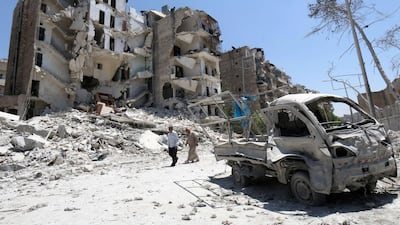Beirut // The US-led coalition against ISIL carried out some of its heaviest airstrikes yet on the extremist group’s de facto capital in Syria at the weekend.
The coalition said the 16 strikes in Raqqa city on Saturday night and Sunday morning “severely constricted terrorist freedom of movement”.
Coalition forces “successfully engaged multiple targets” throughout Raqqa, destroying ISIL structures and transit routes, spokesman Lt Col Thomas Gilleran said.
He said the strikes were some of the heaviest by the coalition since it began carrying out raids against ISIL in Syria last September, and were executed “to deny Daesh the ability to move military capabilities throughout Syria and into Iraq”.
“This was one of the largest deliberate engagements we have conducted to date in Syria and it will have debilitating effects on Daesh’s ability to move from Raqqa,” he said.
More than 30 people were killed in the strikes, most of them ISIL fighters but also six civilians, including a child, according the Syrian Observatory for Human Rights.
The sustained airstrikes add pressure on ISIL after it lost the town of Tal Abyad to Kurdish fighters last month. The town on the Turkish border was a major avenue for commerce and smuggling for the group.
The extremist group on Sunday carried out a double car bombing that killed 11 regime forces at a checkpoint in the north-western city of Hassakeh.
The militants recently launched a fresh attempt to seize the regime-held section of the city, which is partly controlled by Syrian Kurdish forces.
Elsewhere in Syria, regime forces backed by fighters from Lebanon’s Hizbollah movement entered the town of Zabadani on Sunday in a bid to take the last rebel-held bastion along the Lebanese border.
Syrian state television and Hizbollah’s Al Manar TV announced the advance on Sunday, a day after a major operation to retake the town was launched.
Intense clashes were under way in the east and west of the town, according to the Observatory.
Army helicopters dropped at least 22 barrel bombs on the town and were also shelling it heavily, the Britain-based monitoring group said.
At least 14 regime and Hizbollah fighters were killed in 24 hours of fighting, along with at least 12 rebels.
Zabadani was one of the first towns to fall into rebel hands, in early 2012, and is now the opposition’s only remaining stronghold along the Lebanese border.
The town is strategically important for the regime in part because of its proximity to the capital and the highway that runs from Damascus to Beirut.
Zabadani has been under siege for more than a year, and most of the civilians have already fled, according to activists.
In the northern city of Aleppo, fighting continued between government forces and two rebel coalitions seeking to capture regime-held districts in the west of the city.
The Observatory said an assault by a grouping of Islamist fighters and Al-Qaeda affiliate Al-Nusra Front on the Zahra neighbourhood had largely failed, but that fighting on the outskirts of the district was ongoing.
A second coalition of more moderate rebels, known as Conquest of Aleppo, has captured a military barracks in one neighbourhood, though regime forces were battling on Sunday to recapture the facility.
Aleppo city, once Syria’s economic powerhouse, has been divided into government-held territory in the west and rebel-held territory in the east since shortly after fighting arrived there in mid-2012.
The situation is largely reversed in the countryside surrounding the city, and both sides have at times attempted to encircle the other portion of Aleppo and lay siege to their opponents.
The latest fighting in western Aleppo began earlier this week and is some of the fiercest seen in the area since mid-2012.
More than 230,000 people have been killed in Syria’s conflict, which began in March 2011.
* Agence France-Presse with additional reporting from Associated Press

